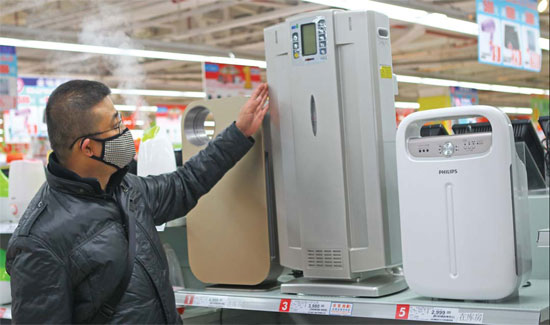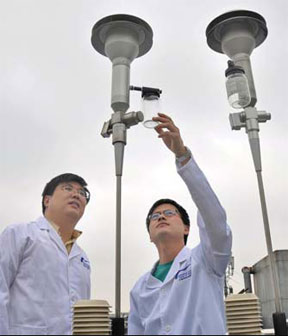Pollution solutions
Updated: 2013-02-08 07:53
By Yu Wei, Cecily Liu, Zhang Chunyan and Jiang Xueqing (China Daily)
|
||||||||
|
A man examines an air purifier in Beijing. The capital and parts of China were hit by severe air pollution in January. Zou Hong / China Daily |
Monitoring air quality in china is becoming big business
China's efforts to assess the problem of smog hanging over Beijing and other cities has meant business for Western providers of specialized air-monitoring equipment, and this could pick up with efforts to clear the skies.
"It's only recently that equipment able to monitor PM2.5 has been manufactured in China," says Jo Ann Choi Pottberg, director of global sales and marketing at Met One Instruments Inc. The Oregon-based maker of weather-related sensors, which expanded to China in 1992, supplies monitors to the US embassy in Beijing and consulates in Shanghai and Guangzhou.
PM2.5 is a type of fine particulate matter most commonly emitted by motor vehicles, especially diesel-powered trucks, and is harmful to human health. Many residents have suffered the discomfort of the so-called Beijing cough and donned protective face masks to walk outside.
On Jan 12 the air-quality monitor operated by the US embassy in Beijing recorded a PM2.5 level of 886 micrograms a cubic meter, nearly 35 times what the World Health Organization considers safe.
On Jan 27 the air pollution index reached 420 to 440 at six downtown districts of Beijing, according to the Municipal Environmental Monitoring Center. The capital and parts of China were beset by heavy smog for two weeks.
Outside Beijing, about 20 provinces were affected by a blanket of pollution, prompting authorities to maintain yellow alerts for smog and haze in central and eastern China, according to the website of the China Meteorological Administration.
With the pace of research and development into air-quality monitoring expected to accelerate, business in China for companies with expertise in this area is expected to rise.
"More than 70 percent of PM2.5 monitoring equipment used in China is made by overseas companies, most likely companies in the US," says Wang Yuesi, a researcher at the Chinese Academy of Sciences.
Reliance on foreign-made equipment is mainly because Chinese enterprises lack "sufficient skills" to make such devices, Wang says.
However, China is certain to speed up R&D into air-quality monitoring in response to the recent smog, he says.
Certification standards for monitors are strict. Because certifiable data is required, customers usually seek out monitors that meet criteria set by the US Environmental Protection Agency or European standards such as TUeV, MCerts or ENS. To become certified, companies must undergo reviews that are often lengthy because the equipment has to be tested in different seasons and locations, Pottberg says.
Technological research into monitoring equipment is relatively new in China. Pottberg says the country still needs to buy particulate-matter, or PM, monitors that use technology approved by environmental experts worldwide so that the public gets accurate, reliable data.
"It won't be long before some local manufacturers will be able to achieve the same quality and reliability as monitors produced after more than 30 years of research and development and field experience," she says.
The Chinese government began monitoring PM2.5 last year. By December it had established a network of real-time monitors for PM2.5 intensity in 74 cities nationwide.
"We are all amazed at how quickly China has implemented the PM2.5 monitoring network," Pottberg says.
She estimates that her company's business in China has risen tenfold since 1998, when the country started buying Met One's instruments, including monitors for BAM (beta attenuation method) checking of particulates PM10, PM2.5 and PM1.
"Right now, China ranks among our top five global markets, and we are hoping to continue doing business there for a long time, with all kinds of products," she says.
Automated Precision Inc, a Maryland company that makes laser-based metrology products used in the aerospace, auto and energy industries, has similarly high expectations.
"We have had a dramatic increase - more than 30 percent last year - in the number of Chinese customers from the clean-energy field," says Andrew Martel, API's marketing and communications manager.
The company entered the Chinese market in 2001 and now has nine offices or subsidiaries around the country as well as a 20,000-square-meter factory in Chengdu, in Sichuan province, that employs more than 200 people in R&D and manufacturing.
"Over the past decade, API has sold more than 1,000 instruments and accessories in China, totaling millions of dollars each year," Martel says.
Demand for the company's products and services from "green" energy companies has also increased. Martel considers China a market that will continue to grow in sync with increased energy demand and consumption.
"Our technology is used in the assembly of many alternative-energy components, including wind turbines, solar panels and nuclear plant construction. However, that technology also allows auto and plane manufacturers to build more fuel-efficient vehicles," he says.
"We believe this will be increasingly important to these manufacturers and we expect strong demand for our technology from auto and aerospace companies for this purpose."
US companies are not the only ones benefiting. A number of European clean-technology companies have been eyeing opportunities as China's air pollution worsens due to rampant coal consumption and increased vehicle-exhaust emissions.
"The opportunities for low-emission technology in China are huge, and we can help Chinese companies with their technology," says Dave Shemmans, CEO of the British engineering firm Ricardo PLC.
Since establishing a subsidiary in Shanghai eight years ago, Ricardo has helped a number of Chinese companies develop energy-efficient products, particularly in the auto industry.
"Our Chinese clients send their employees to our research-and-development center in the UK, and they work with our staff to develop new technology," Shemmans says.
"They can then take this technology back to China and teach their colleagues how to use it."
Marco Warth, engineering director at Mahle Powertrain Ltd, the British arm of the Germany-based Mahle GmbH, also sees the pollution problem in China providing opportunities for his company.
"We can definitely help China improve air quality by helping automotive companies improve the energy efficiency of their engines," he says.
In 2007 Mahle Powertrain set up a subsidiary in Shanghai that now helps many Chinese auto makers design, develop and produce prototypes of high-efficiency, low-emission drivetrains that comply with Euro 5 and 6 standards, so that they can export their products to Europe.
Meanwhile, clean-tech companies from Germany are also scouting opportunities to help China deal with pollution, says Michael Schumann, head of German-Chinese joint initiatives at the Federal Association for Economic Development and Foreign Trade, a private-sector group.
|
Inspectors from the environmental protection bureau in Ningbo, Zhejiang province, check equipment that monitors air quality in the city. Hu Xuejun / For China Daily |
His team will focus on introducing more German clean-technology innovations to China this year, he says.
Marco Voigt, managing director of VKPartner, a German consulting firm for the clean-technology industry, organized the IndustrialGreenTec conference at the Hannover Messe technology fair last year. The day-long event, which enabled companies to gather and discuss possible cooperation, was so successful that Voigt plans to organize a similar conference in China, he says.
Friedrich von Ploetz, managing director of SunCoal Industries GmbH of Germany, which helps customers turn organic waste to solid biofuel, sees opportunities in helping China replace fossil coal with "bio-coal".
"I understand that China's high level of CO2 emissions mostly come from coal-fired power plants," he says.
"However, we've heard that in China, agricultural straw is often burned too, causing environmental problems in agricultural areas. So turning agricultural waste into bio-coal to replace coal would solve both problems."
Richard Gaul, a member of the supervisory board of Kolibri Power Systems AG, a German company that specializes in power-storage technology, sees great potential in China for renewable energy, which can be stored using the batteries Kolibri is developing.
"The issue with renewable energies like wind and solar in comparison with fossil-fuel technology is the uncertainty of power generation, but power-storage technology can help store energy for use when needed. Hence, our technology helps customers make the transition from fossil-fuel energy to renewable energy," Gaul says.
Controlling PM2.5 intensity should be raised to a national level, the Environmental Protection Minister, Zhou Shengxian, said during the conference on environmental protection in Beijing in January.
"The network of real-time air-quality monitoring on PM2.5 will cover 113 cities throughout the country this year," he said. Zhou has also announced a ban on the use of vehicles registered before 2005, under exhaust-emissions requirements, although details are unclear.
Last year, Hebei Sailhero Environmental Protection Hi-Tech Co sold air-quality monitors to monitoring stations in 23 Chinese provinces, and the company estimates that net profit rose 14 percent to 29 percent year-on-year.
Since the Chinese authorities imposed stricter standards on air-pollution monitoring last year, government investment in each monitoring station has almost doubled to more than 1 million, says Liu Guoyun, assistant to the president of Hebei Sailhero.
"Given that our company holds more than 30 percent of the domestic industry's market share, and the PM2.5 monitoring network will be expanded to 113 cities from 74 this year, we expect sales revenue to increase more than 20 percent," Liu says.
Completing and maintaining a world-class air-quality monitoring network nationwide is just a first step, says David Vance Wagner, senior researcher at the International Council on Clean Transportation. "I think the more important long-term challenge for China is to implement stringent emissions controls that will effectively reduce the emission of pollutants and improve air quality."
Wu Wencong and Zhang Yuchen contributed to this story.
Contact the reporters through yuwei12@chinadailyusa.com
(China Daily 02/08/2013 page16)

 Li Na on Time cover, makes influential 100 list
Li Na on Time cover, makes influential 100 list
 FBI releases photos of 2 Boston bombings suspects
FBI releases photos of 2 Boston bombings suspects
 World's wackiest hairstyles
World's wackiest hairstyles
 Sandstorms strike Northwest China
Sandstorms strike Northwest China
 Never-seen photos of Madonna on display
Never-seen photos of Madonna on display
 H7N9 outbreak linked to waterfowl migration
H7N9 outbreak linked to waterfowl migration
 Dozens feared dead in Texas plant blast
Dozens feared dead in Texas plant blast
 Venezuelan court rules out manual votes counting
Venezuelan court rules out manual votes counting
Most Viewed
Editor's Picks

|

|

|

|

|

|
Today's Top News
Boston bombing suspect reported cornered on boat
7.0-magnitude quake hits Sichuan
Cross-talk artist helps to spread the word
'Green' awareness levels drop in Beijing
Palace Museum spruces up
First couple on Time's list of most influential
H7N9 flu transmission studied
Trading channels 'need to broaden'
US Weekly

|

|









